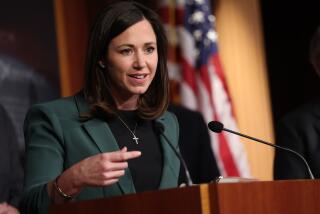Sen. Clinton Is Where She Didn’t Want to Be
- Share via
WASHINGTON — She came to Capitol Hill amid lofty expectations, the first presidential spouse ever elected to public office and one of a phalanx of Democrats who gave the party new life in a Senate evenly split with Republicans.
But the debut of Sen. Hillary Rodham Clinton, while promising initially, has become a disaster.
For the new senator from New York, mounting questions about what she and her husband did and didn’t know when he issued last-minute pardons to felons and a fugitive are a monumental embarrassment.
This new episode and other ethical questions that have shadowed Sen. Clinton during her transition from the White House to the Capitol--a mega-deal for her memoirs, the acceptance of a shower of gifts from wealthy friends--have come at the worst possible time for her and her party.
Sen. Clinton and other congressional Democrats are seeking to develop a strategy of opposition to the Bush administration as Republicans move aggressively to rewrite the federal budget and cut taxes. The GOP is wielding nearly all levers of federal power for the first time since the 1950s.
But a coherent opposition strategy, if it yet exists, has been eclipsed by the seemingly never-ending string of Clinton controversies. How could the revised Democratic position on tax cuts possibly compete with this week’s revelations about presidential brother-in-law Hugh Rodham’s grab for influence? Or the revelations about the pardon of fugitive businessman Marc Rich, whose ex-wife gave generously to Democratic causes?
“It is certainly not how I would have preferred or planned to start my Senate career,” Sen. Clinton acknowledged Thursday in a news conference, “and I regret deeply that there has been these kinds of matters occurring.”
Many Democratic strategists are alarmed by a turn of events that has reminded the public of what they least liked about the two-term Clinton administration: Whitewater, Travelgate, Monica, Paula, the Rose Law Firm, the Lincoln Bedroom and all the rest.
“Clinton fatigue has reached its climax,” said one senior Senate Democratic strategist, who, like several others, declined to be quoted by name. “They have virtually no defenders in any of this.”
Democrats, forced to confront the controversies even as they try to redefine their party in the post-Clinton era, are searching desperately for silver linings. One beleaguered Democratic leadership aide noted that at least the fresh revelations about the Clinton pardons did not coincide with the upcoming release of the Bush budget--a time when the party wants to go on the attack. “Better this week than next week,” the aide said.
Another plus cited by Democratic strategists: talk of putting Sen. Clinton on the party’s national ticket in 2004 is bound to recede, clearing the field for other Democrats.
“Not only can she forget about running for president,” said University of Virginia political analyst Larry Sabato, “she isn’t going to be on anyone’s credible list for [vice president]. To do so would produce two months of scandal stories--just regurgitating what’s happened.”
Clearly the Clinton problems are a gift to President Bush and congressional Republicans. A new Gallup Poll shows that Bush’s favorable ratings, which were about tied with President Clinton’s late last year, have risen sharply while Bill Clinton’s numbers have fallen. Sen. Clinton’s ratings have also dropped but not quite as sharply.
Ironically, this week’s revelations--including another on Thursday that the senator’s campaign treasurer had a hand in two successful pardon applications--followed a spell of several weeks in which Clinton appeared to be making headway in her bid to remake her image from lightning-rod first lady to just another diligent freshman senator seeking to learn her way around the upper chamber of Congress.
Following the prescribed tradition for freshmen, Sen. Clinton has been doing far more listening than public speaking. She had lunch recently with Sen. Charles Hagel (R-Neb.) in his office and at his invitation. She has sat quietly in the chair of the Senate’s presiding officer during floor debates to learn the chamber’s rules and customs.
She waited for more than a month to make her first floor speech, on health care, a subject on which she is an acknowledged expert. The Feb. 13 speech even included a self-deprecating reference to her own failed health-care initiative in 1993-94.
On ethical matters, Clinton so far has largely avoided catching any public flak from her colleagues. The Senate Select Committee on Ethics declined to criticize a controversial book deal she cut with Simon & Schuster. That deal, reached before she took office on Jan. 3, promised Clinton $8 million for her memoirs.
Senators naturally are loath to criticize their own. Plenty of others have been in ethical scrapes before. Sen. John McCain (R-Ariz.) survived the Keating Five donor-influence scandal. Sen. Robert Torricelli (D-N.J.) is taking heat for his campaign’s 1996 fund-raising. But both senators are highly effective on Capitol Hill.
Eventually, though, Clinton will risk exhausting her goodwill with other senators unless she can steer clear of controversy for a while. As political analyst Ross K. Baker of Rutgers University noted, the Clintons have caused a problem for all Democratic senators. “When Sen. Arlen Specter (R-Pa.) is asking questions of [former White House Counsel] Jack Quinn, do Democratic senators just sit there mutely?”
Eventually too, the Clintons will have to give Sen. Tom Daschle (D-S.D.) and Rep. Richard A. Gephardt (D-Mo.), the minority leaders, some room to maneuver. “As long as the focus is on [Bill] Clinton, it becomes harder for Gephardt and Daschle to establish clear voices for the Democrats right now,” said one party strategist.
More to Read
Get the L.A. Times Politics newsletter
Deeply reported insights into legislation, politics and policy from Sacramento, Washington and beyond. In your inbox twice per week.
You may occasionally receive promotional content from the Los Angeles Times.











